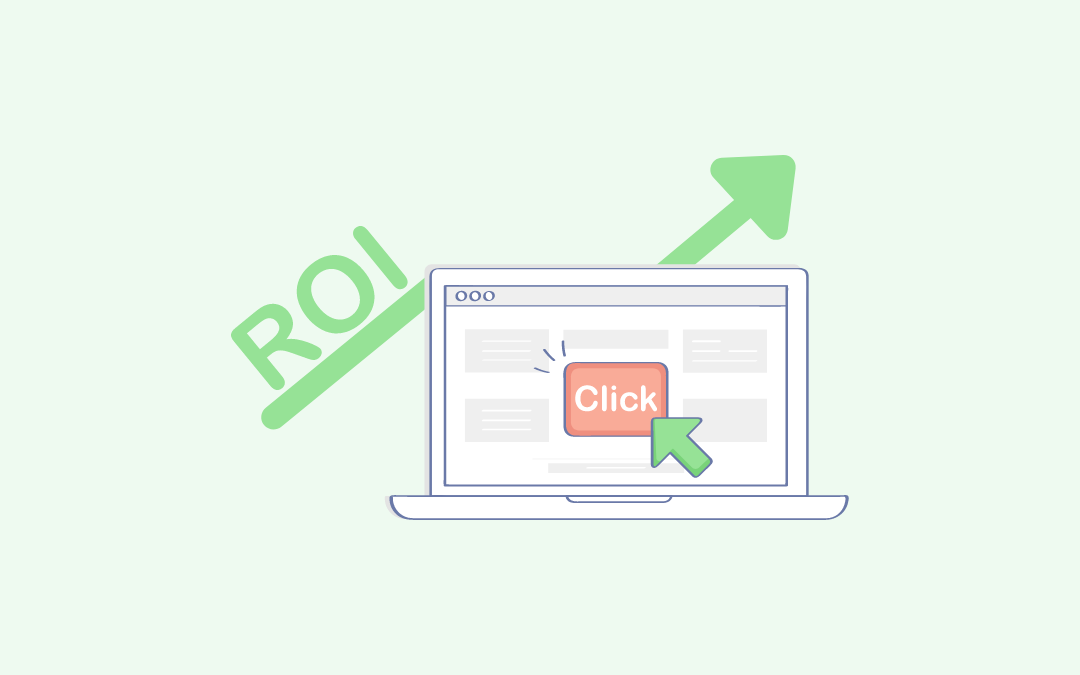Choosing the right CRM for your business can be a tricky task. There are several things to consider, including the features you’ll need, how much it will cost, whether it will work with your existing software, and much more.
When it comes to CRM, there are too many options to choose from and too many variables to account for.
Don’t lose hope yet!
With an effective and thorough CRM comparison process, you can find the most suitable tool that keeps your company on the path to success. Such a comparison should take into account the unique needs of your organization, the scope of implementation of the CRM, and future objectives.
It may be daunting to compare the hundreds of options currently available on the market. This is why we have taken it upon ourselves to create this CRM software comparison guide to help you land the most effective solution.
Here is a quick list of the tools that we’ll be comparing in this guide:
- BIGContacts: The best CRM and email marketing tool for small to medium-sized businesses
- HubSpot: A CRM solution that aids marketing, sales, and customer service
- Salesforce: An industry leader with powerful customization options
- Bitrix24: A comprehensive CRM solution with powerful sales management tools
- Insightly: A simple and scalable solution that accelerates business growth
What is CRM?
CRM or customer relationship management software solution work as a repository of customer information that can be utilized to drive personalized engagement and foster long-term relationships. These tools perform a wide range of business functions, such as manage contacts, delivering emails, scheduling meetings, tracking tasks, managing sales pipelines, automating workflows, and creating reports.
CRM tools enhance accessibility to relevant customer data, including their contact information, emails, files, social media activity, transaction history, etc. It brings the entire organization together, making it easier for everyone to view and share updated information.
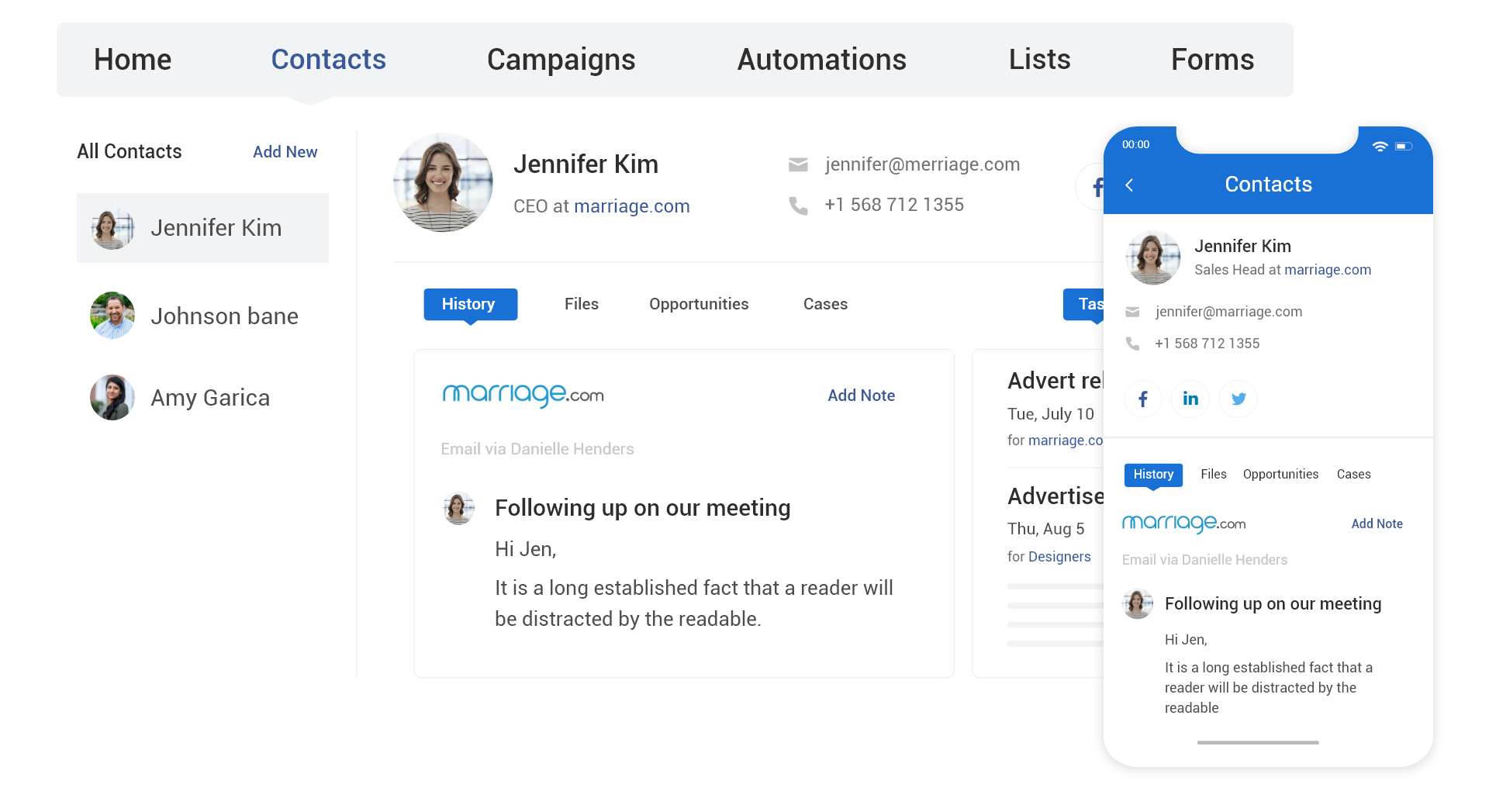
5 Benefits of CRM
“Our greatest asset is the customer! Treat each customer as if they are the only one!” – Laurice Leitao.
It goes without saying- customer relationships are key to your business growth. So it is important that you manage them as efficiently as possible. That’s where a CRM steps in.
Having the right CRM in place for your business can help you:
1. Build Long-Term Relationships
CRM helps you find and focus on the right people. It brings all relevant data to one place and enhances its accessibility. This helps build more sustainable and successful relationships that yield an improvement in your business profits.
2. Improve Customer Satisfaction
An efficient CRM that functions as contact management software can result in enhanced personalization and improved loyalty. CRM also contributes to enhanced service experiences by bringing contact data and tickets together, which positively impacts your customer retention rate.
3. Boost Employee Productivity
Your employees can work more productively when they have instant access to updated business information. CRM enables everyone in the organization to collaborate more effectively and work toward accomplishing the business objectives.
4. Cut Costs & Improve Resource Utilization
CRM lets you drive better outcomes for the organization by improving resource management and reducing costs. It helps automate redundant tasks, eliminate roadblocks, and close deals faster, all of which result in improved business profitability.
5. Improve Business Decision-Making
A CRM tool with robust business intelligence features enables you to make better business decisions. Such a tool allows you to create in-depth reports and service actionable insights from them to improve the effectiveness of your business operations.
CRM Comparison- at a Glance
Check out a CRM feature comparison chart of the 5 most popular solutions.
| Contact Management | Custom Sales Pipeline | Automated Workflows | Mobile Access | Pre-Built Reports | Pricing | |
|---|---|---|---|---|---|---|
| BIGContacts | ✓ | ✓ | ✓ | ✓ | ✓ | Forever free plan for startups with 100 contacts. Paid starts at $9.90/month with a 15-day free trial. |
| HubSpot | ✓ | ✓ | ✓ | ✓ | ✓ | Starts from $45/month |
| Salesforce | ✓ | ✓ | ✓ | ✓ | ⨯ | Starts from $25/user/month |
| Bitrix24 | ✓ | ✓ | ✓ | ✓ | ⨯ | Starts from $46/month |
| Insightly | ✓ | ✓ | ✓ | ✓ | ✓ | Starts from $29/user/month |
Why Compare CRM Features?
91% of organizations with more than ten employees use CRM systems to enhance customer engagement and build stronger relationships.
Due to this widespread popularity, a plethora of CRM vendors offering varied features and functionalities have come up. But the question ‘How do you find the most suitable CRM solution for your business?’ still stands.
The best way to avoid wasting time and money on a below-par tool is to focus on the features that carry the most value for your business. Take into consideration the core CRM features, as well as the advanced functionality that your team requires. A detailed analysis of the tool’s capabilities will guarantee that you get the most out of your resources and efforts.
Wondering which features are worth including in your comparison strategy?
To help you out, we have put together the following list of the most important CRM features.
Essential CRM Features to Look For
CRM comparison can only be successful if you pay attention to the right features. While a host of CRM features are available, you have to choose the most influential ones carefully.
Following are the essential features to include in your CRM tool comparison:
Contact Management
The tool should make it easier to track relevant contact data from a single place. It should let you log and track all communication with contacts effortlessly. Furthermore, it must enable contact segmentation and targeting.
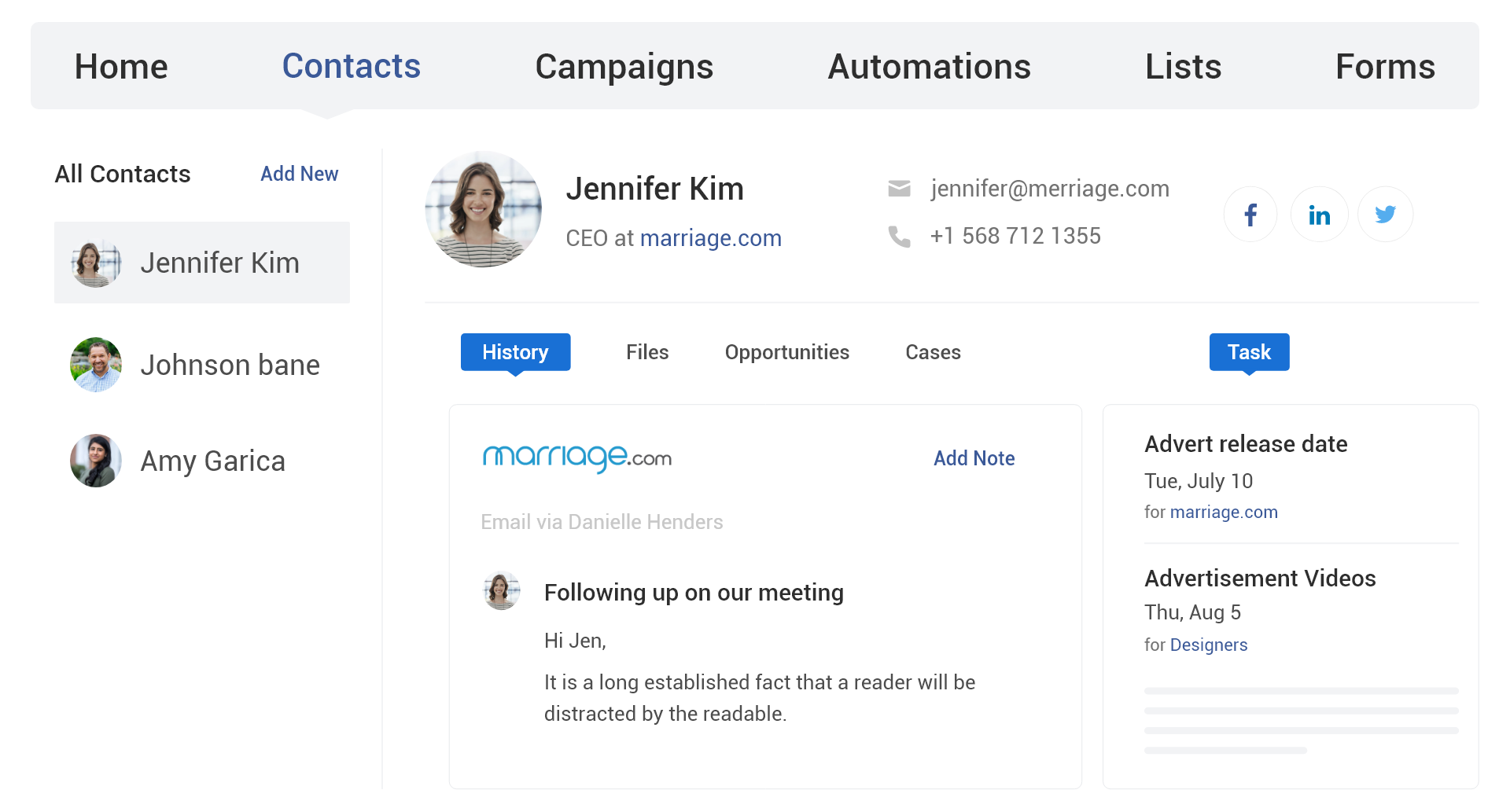
Pipeline Management
Proper sales pipeline management is integral to CRM. This is why you must opt for a tool that lets you customize the stages of the sales pipeline, drag and drop leads, and define rules and triggers that keep deals moving forward.
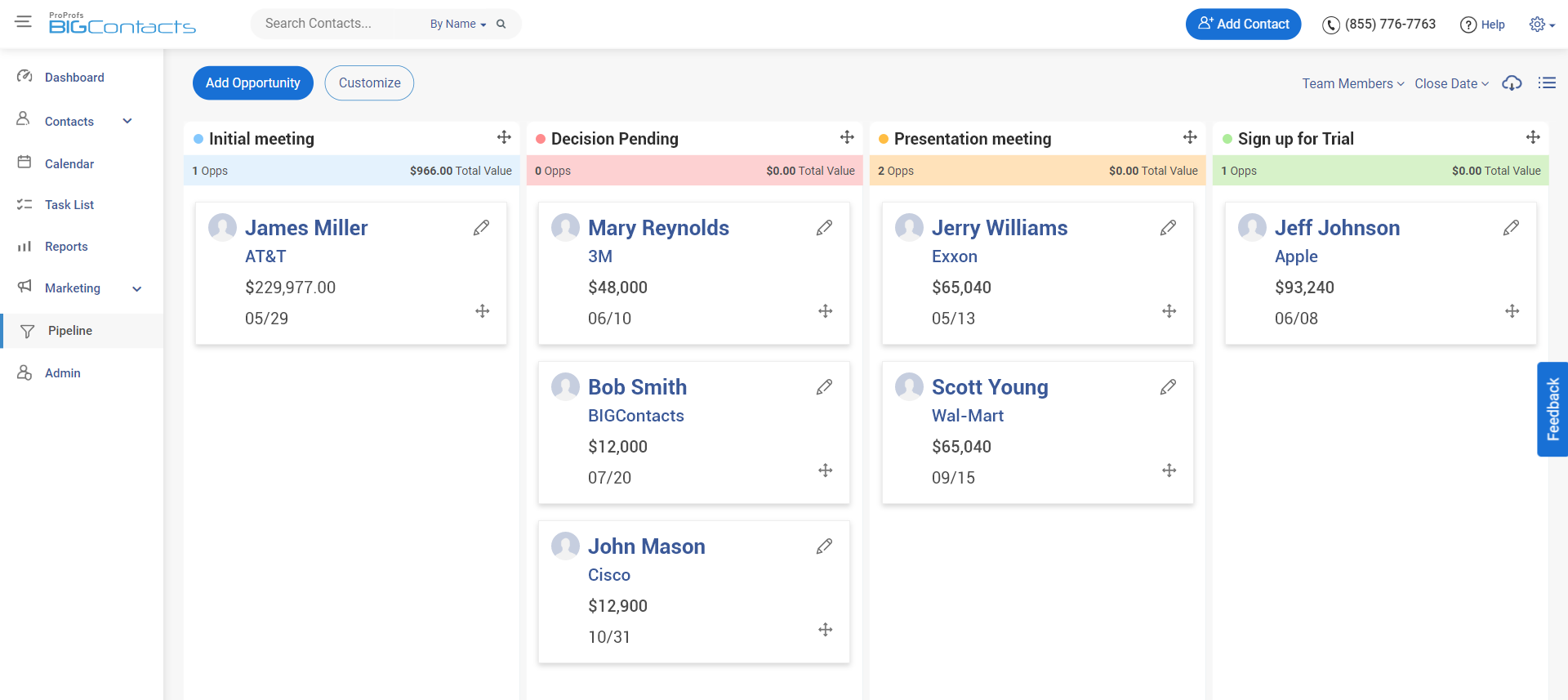
Integrations
An important point of consideration during the CRM selection process is if the tool integrates with the software you use to run your business. When comparing CRM tools, make sure to analyze the types of integrations offered and whether they align with your needs.
Automation
Choose a tool that lets you leverage automation to drive business growth. Such an application will enable you to automate workflows, tasks, and alerts. This leads to enhanced productivity and reduced errors.
Mobile Access
By 2026, the CRM for mobile software market is expected to grow to $39.37 billion at a CAGR of 13.5%.
This is a result of the advancement in the capabilities of cloud-based CRM applications. Mobile access can enable you to manage customer relationships from anywhere. It makes for improved customer experiences by keeping things moving forward without any delays or inefficiencies.
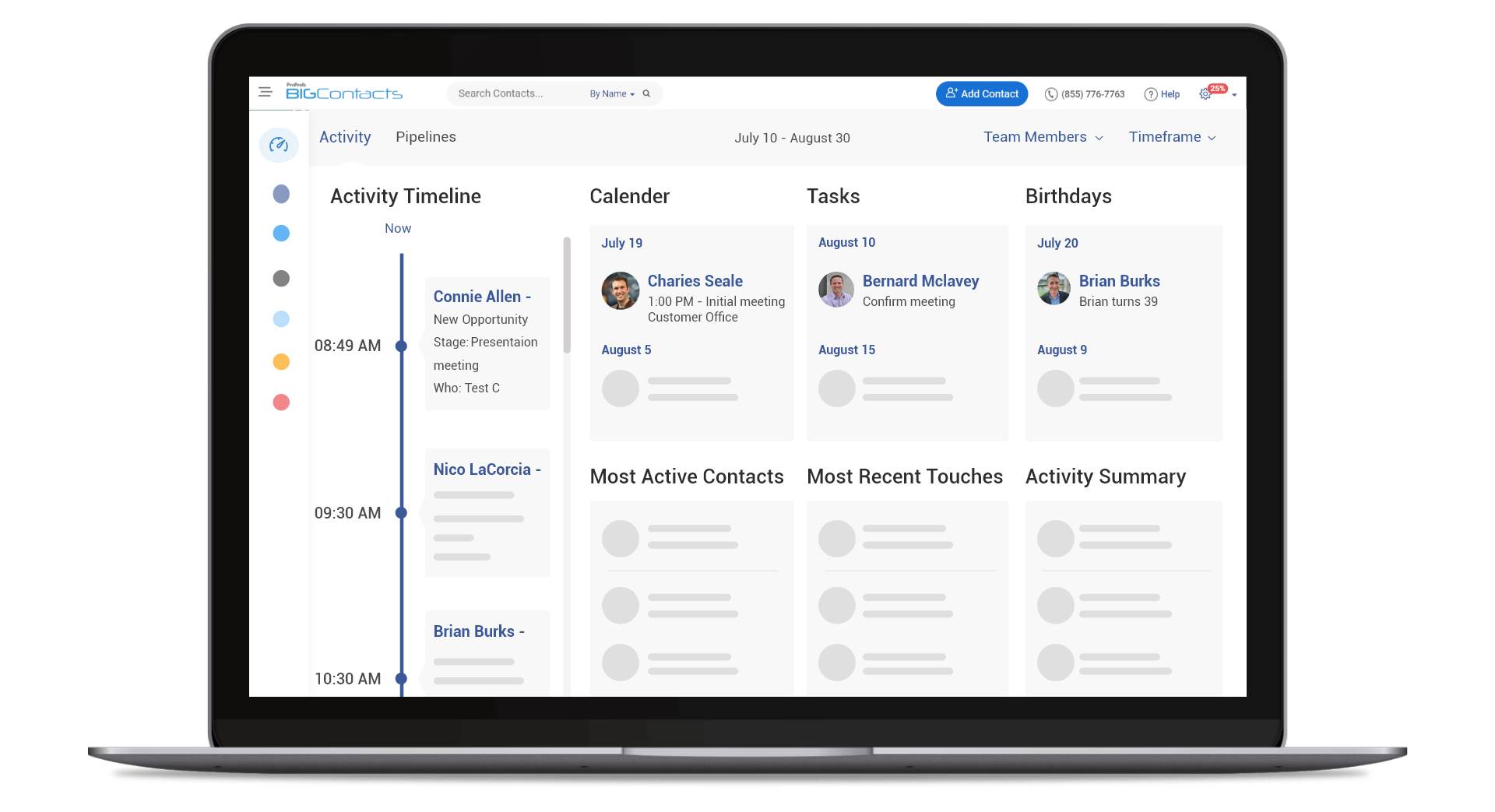
Reporting & Analytics
The tool should enable you to track key metrics by generating reports and dashboards. With access to analytics data, you can discover areas of improvement and optimize business processes to improve performance.
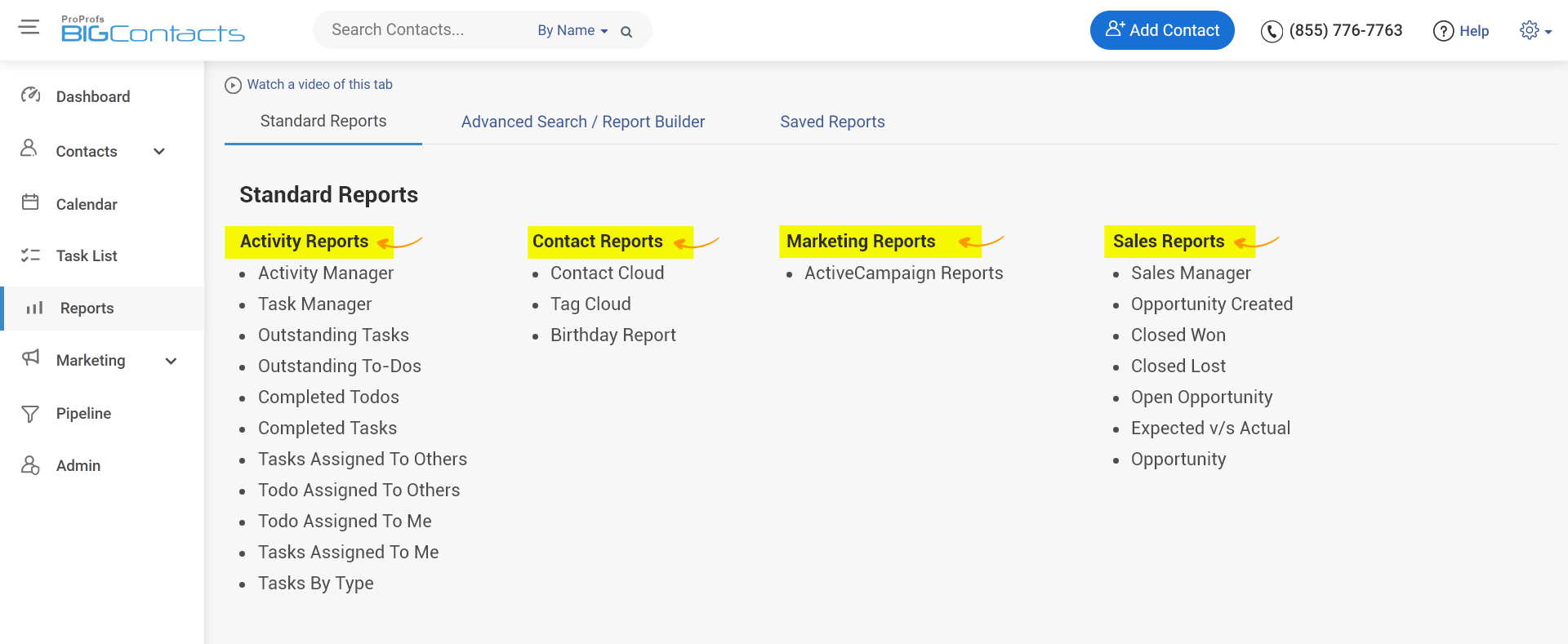
Customization
Lastly, a crucial feature to consider is the extent of customization offered. Opt for a flexible solution that lets you adapt various modules according to your specific needs. These include data fields in contact records, pipeline stages, user access roles, etc.
Choosing a CRM: What to Keep in Mind
When it comes to the comparison of CRM, your requirements will be as unique as your business. Often, there is no one-size-fits-all software provider. The right choice will depend on what you wish to improve. For example, you may want to close more sales, integrate the tool with your email marketing provider, or simply track the most relevant metrics.
To find the most suitable CRM tool, you need to craft a powerful software selection strategy centered around your specific objectives. This should include a multi-pronged approach to comparison and selection.
To help you decide which CRM solution is best for you and your business, here are some key questions to ask yourself:
How easy is the CRM software to use?
Running a business is hard work. You probably don’t have much time to spare. This is why the CRM you pick should be easy to use and have a minimal training curve.
Will it integrate with your tech stack?
You want a CRM tool that is a team player and works well with all your existing business applications. A tool offering a range of native and third-party integration options will keep your data seamlessly synchronized across platforms.
Is it accessible remotely?
A cloud-based CRM software will help you access important business data from any location and device. Tools offering dedicated iOS and Android apps
What’s your budget?
Budget is a top priority for CRM comparison and selection. Choose a tool that is affordable, devoid of any hidden costs, and has a free trial period.
Is it scalable?
You need to pick a tool that is scalable and can grow with your business. After all, you don’t want to have to keep switching CRMs after every growth spurt.
Top 5 CRM Compared
Check out an in-depth comparison of the functionality of the 5 leading CRM software solutions that you can choose from.
1. BIGContacts
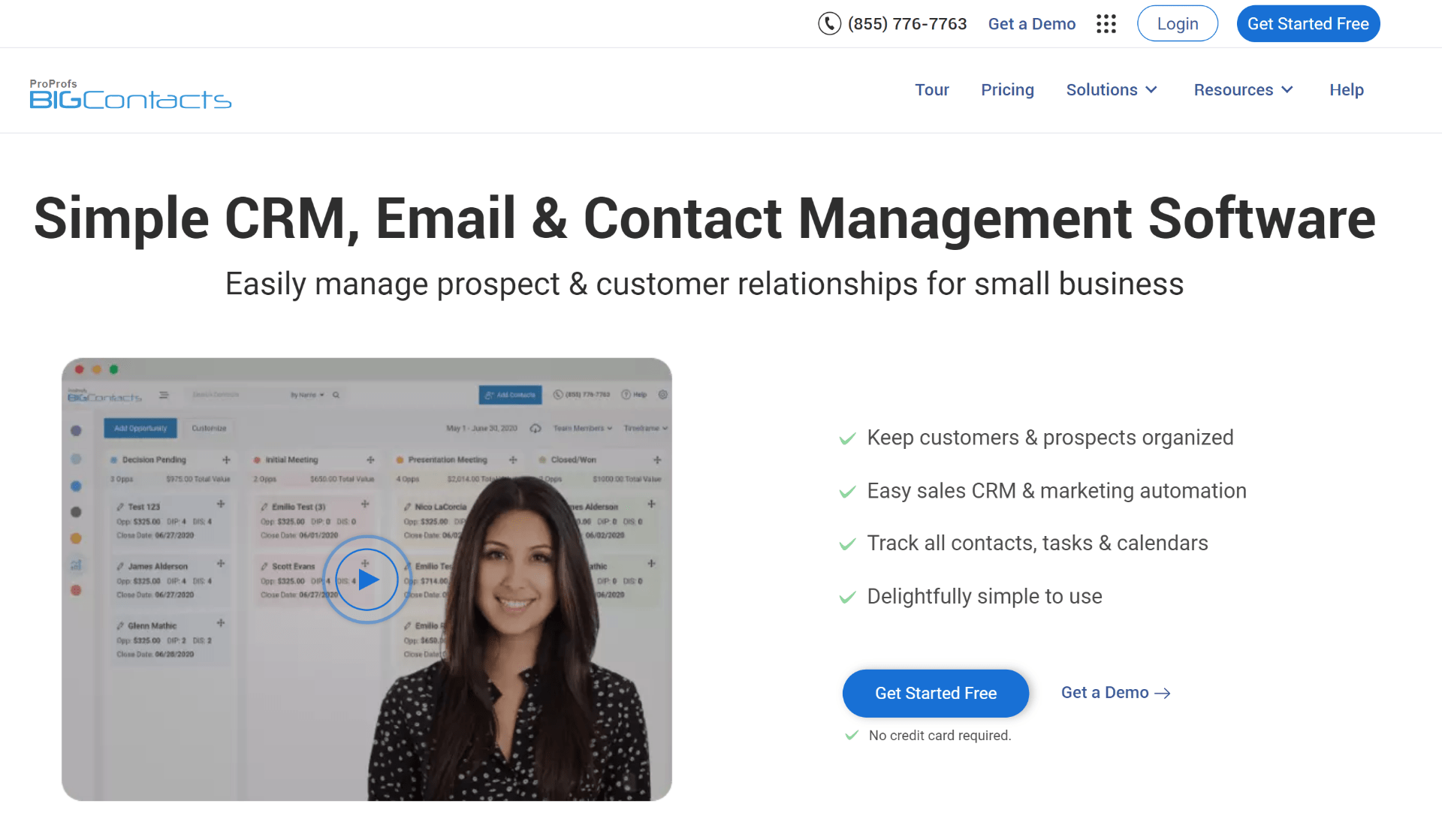
Regarded as a premier CRM solution for small to medium-sized enterprises, BIGContacts is a highly intuitive and customizable software. It provides remote access to essential customer data and lets you automate workflows to improve business efficiency. The tool also offers excellent email tracking and marketing functionality to engage with customers efficiently.
Key Features:
- Get a 360° view of contacts, including their details, communication history, files, notes, social media handles, etc.
- Automate tasks, workflows, and alerts to improve organizational efficiency
- Create and deliver personalized drip email sequences to enhance customer engagement
- Manage opportunities using a custom sales pipeline view
- Generate reports using advanced filters or choose from a range of pre-built options
Pros:
- Extensive customization options are available for fields, layouts, dashboards, pipeline stages, user roles, etc.
- Accessible on any smartphone, tablet, or desktop
Cons:
- Emails with images are slow to load
- AI-powered lead-scoring functionality is missing
Pricing:
- Forever free plan for startups with 100 contacts. Paid starts at $9.90/month with a 15-day free trial.
2. HubSpot CRM
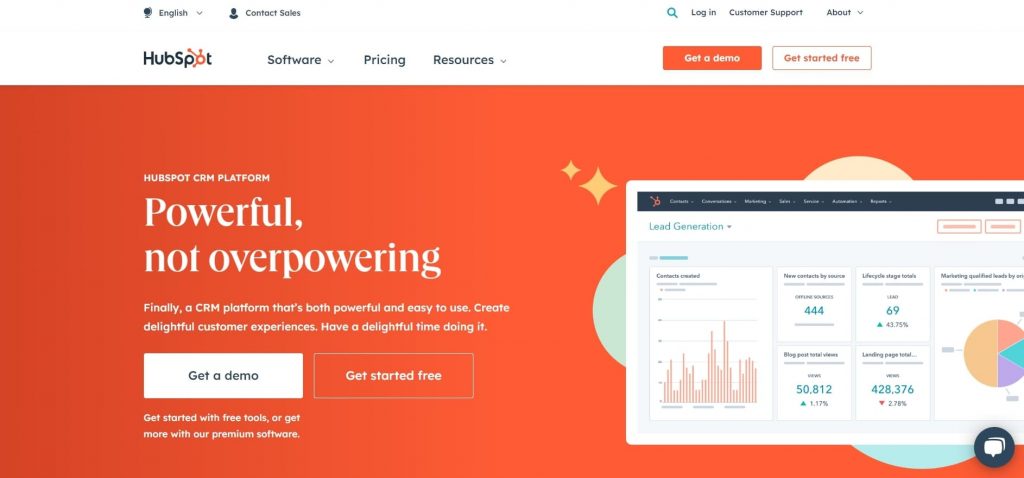
HubSpot CRM is a leading CRM offering powerful features that help sales, marketing, operations, and service teams. It provides real-time visibility into sales opportunities, team performance, and process effectiveness. Use HubSpot for pipeline management, lead generation, deal tracking, business analytics, and sales automation. Nurture leads with bulk email and personalized engagement.
Key Features:
- Use a visual sales pipeline to track and manage your leads
- Contact records are automatically populated with data from online sources
- Create custom email templates and store them for future use
- View detailed activity and communication timelines for contacts
- Track all contact details, open tickets, and previous engagements in one place
Pros:
- Connect the tool with your Gmail and Outlook inboxes
- Access the CRM on any device or browsers
Cons:
- A steep pricing model leads to the overall cost increasing rapidly
- The reporting capability is limited
Pricing:
- Free plan available
- Plans start from $45/month
3. Salesforce
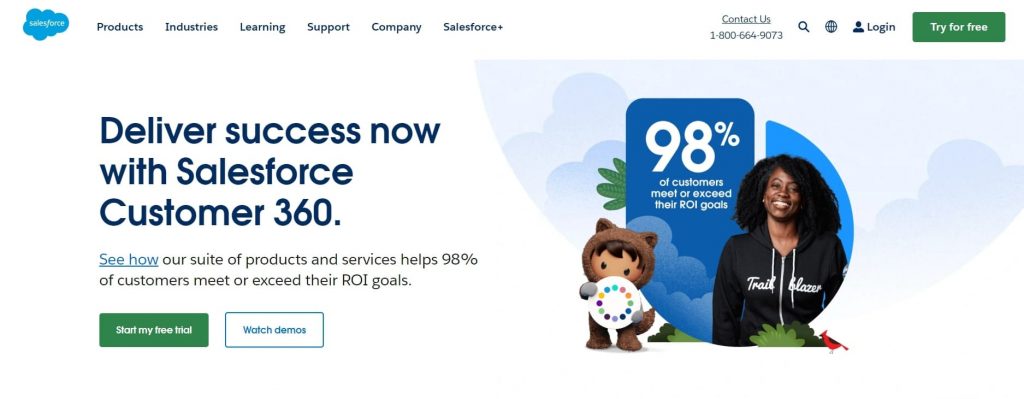
Salesforce is a top-rated and AI-powered CRM solution that can help you scale your business operations. Automate actions and set up instant alerts for your team members using this robust customer relationship management solution. The tool offers extensive customization options that help you adapt it according to your team’s specific needs.
Key Features:
- Personalize support solutions to improve customer experience
- Create automated workflows and set up alerts for instant actions
- Access detailed reports and dashboards to track important business performance metrics
- Get a complete overview of available opportunities with a sales pipeline
- Capture high-quality leads and convert them with dynamic and personalized emails
Pros:
- Automate repetitive processes to improve organizational effectiveness
- Use AI-powered insights to improve customer experiences
Cons:
- Add-ons and customizations increase the overall cost
- A steep learning curve is involved
Pricing:
- Starts from $25/user/month
4. Bitrix24
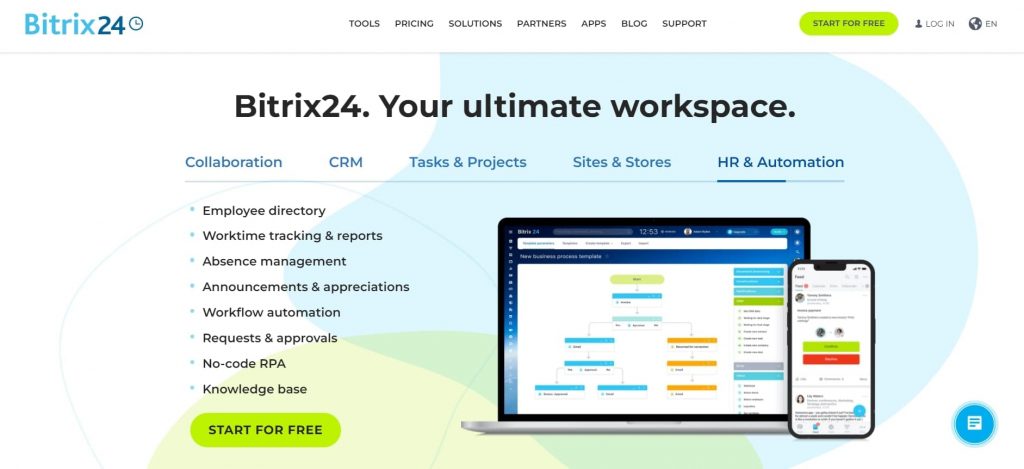
Bitrix24 CRM is a powerful tool for managing sales, marketing, and support processes, to enhance your customer relationships. It lets you automate workflows, capture leads, manage payments, and engage with customers, all from the same platform. With Bitrix24, you can close more deals easily by unifying all essential data and streamlining processes.
Key Features:
- Find contact details, files, and communication history in one place
- Run email marketing and ad targeting campaigns from within your CRM system
- Automate actions and workflows to get things done on time
- Create a custom sales pipeline and set up custom rules and triggers to move deals forward
- Track the effectiveness of business operations with in-depth analytics
Pros:
- Add lead-capturing web forms to your CRM system
- Segment your contacts for email marketing campaigns
Cons:
- The interface is hard to navigate
- The customer service team can be hard to reach at times
Pricing:
- Free plan available
- Starts from $46/month
5. Insightly
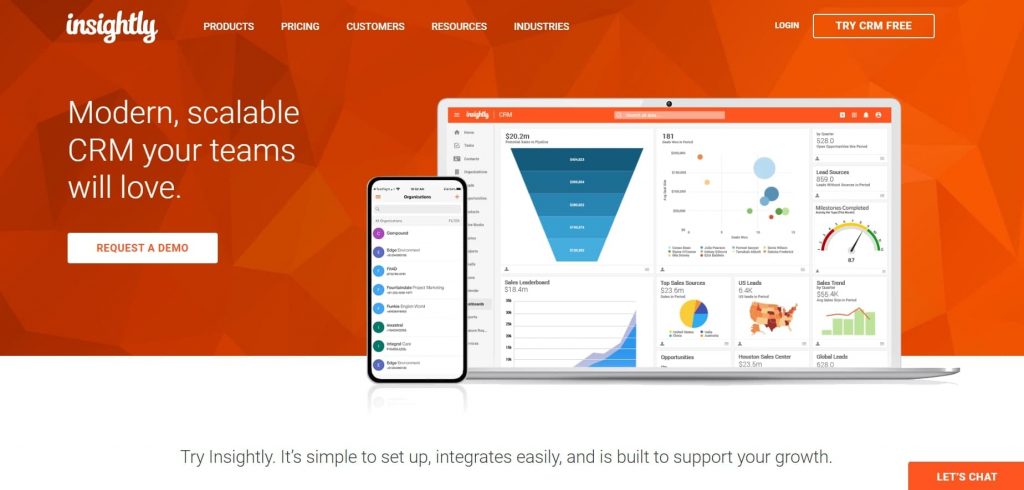
Insightly CRM helps align sales, marketing, and support processes so that you can deliver well-rounded customer experiences. Use it to create multi-step, automated workflows that keep your business running without any inefficiencies. Insightly also allows you to derive actionable insights from your business data and visualize it through reports, making tracking your team’s progress easier.
Key Features:
- Automate tasks, workflows, and email alerts
- View detailed activity timelines for contact, including their source and interaction history
- Use relationship linking to understand the organizational structure of your clients
- Define custom visibility and usage permissions for your team members
- Visualize business performance with dashboards and reports
Pros:
- Route incoming leads to the right representatives automatically
- Create lists of contacts and share bulk emails
Cons:
- Data sorting and filtering should be more advanced
- Limited customization options for the user interface
Pricing:
- Starts from $29/user/month
Multiply Business Growth With the Right CRM Software
Choosing the right CRM for your business can save you a headache later down the line, so it’s worth spending a bit of time making the right choice.
Regardless of the size of your business, it’s always a good idea to map out your needs (and possible future needs) along with your budget, then try to match that up to the right simple CRM solution for small business. Try not to get carried away with having every single feature available. Rather, focus on features that will actively benefit your business now and in the future.
Opt for flexible solutions such as BIGContacts that can be adapted to suit your requirements. Also, make sure to take advantage of the free trial offered by vendors for a more effective and hands-on CRM comparison.
FAQ
What are the 3 Types of CRM?
Broadly, CRM tools can be put into the following 3 categories:
- Analytical CRM: This type of CRM focuses on deriving useful insights from business data with the help of thorough analysis. These insights can be leveraged to improve customer experience and relationships.
- Collaborative CRM: These tools get rid of information silos and bring the entire organization together. They help everyone stay on the same page and work collaboratively to delight customers.
- Operational CRM: Operational CRM tools streamline the processes of sales, marketing, and service teams. They automate processes and contribute to improved internal productivity by managing data and operations efficiently.
Which CRM is Most Popular?
Some of the most popular CRM options currently available on the market include BIGContacts, HubSpot, Salesforce, Bitrix24, and Insightly.
FREE. All Features. FOREVER!
Try our Forever FREE account with all premium features!




